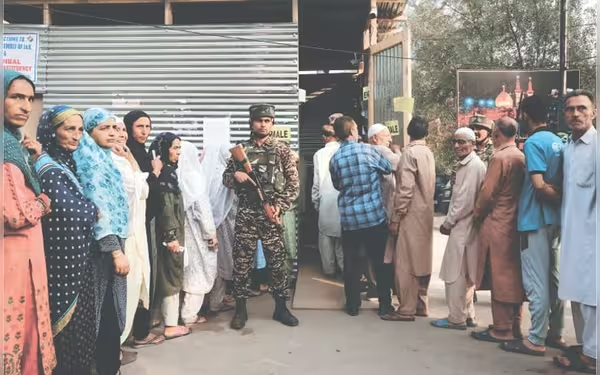Saturday, November 16, 2024 07:46 PM
Foreign Diplomats Observe Elections in Kashmir Amid Tensions
- Foreign diplomats allowed to observe Kashmir elections.
- Local leaders criticize foreign involvement in internal matters.
- Protests held against elections in Azad Jammu and Kashmir.
 Image Credits: dawn
Image Credits: dawnForeign diplomats observe elections in Kashmir, sparking local criticism and protests amid ongoing tensions.
In a significant development, foreign diplomats from approximately 15 countries were granted permission to observe the voting process in India-held Kashmir on Wednesday. This marked the first electoral exercise in the region since 2014, following a long period of political turmoil and unrest. The diplomats included representatives from the embassies of the United States, Mexico, Singapore, Spain, and South Korea, among others. This event comes in the wake of New Delhi's controversial decision in 2019 to revoke the semi-autonomous status of Jammu and Kashmir, a move that has been met with widespread criticism and concern.
As voters queued to cast their ballots during the second phase of elections, soldiers armed with rifles were stationed outside polling stations, underscoring the tense atmosphere in the region. The elections are being conducted in three phases, with the first phase having taken place on September 18, where around 61 percent of eligible voters reportedly participated. The final round of voting is scheduled for October 1, with results expected to be announced a week later.
Jorgan K. Andrews, the deputy chief of mission at the US embassy, expressed his observations, stating, "It is a rare opportunity to come to Kashmir and see the electoral process in action and see democracy. It looks very smooth, everything is very professional." However, this perspective was met with skepticism by local political leaders. Omar Abdullah, leader of the National Conference party, criticized the Modi government for inviting foreign diplomats while simultaneously asserting that Kashmir is an internal matter. He remarked, "Jammu and Kashmir elections are an internal matter for us and we do not need their certificate," highlighting the contradictions in the government's stance.
Despite the challenges, many citizens expressed their desire for representation. Abdul Rahim, a 52-year-old voter, shared his sentiments after casting his vote, saying, "We want to have a representative who will take our grievances forward." The ongoing high unemployment rate and dissatisfaction with the 2019 changes have fueled campaigning efforts, with regional parties pledging to restore autonomy to the region.
In a parallel development, demonstrations were held across the Line of Control (LoC) in Azad Jammu and Kashmir (AJK), where citizens observed a 'Black Day' in protest against the elections in India-held Kashmir. Organized by Pasban-i-Hurriyat Jammu and Kashmir, these protests saw participation from various political and religious groups, all demanding international intervention to address the Kashmir dispute. Protesters voiced their opposition to the elections, asserting that any electoral process conducted under Indian governance lacks legal validity and does not substitute the Kashmiris' right to self-determination.
The situation in Kashmir remains complex and fraught with tension. As the elections unfold, the voices of the people, both in India-held Kashmir and in Azad Jammu and Kashmir, reflect a deep yearning for representation and justice. The international community's role in this ongoing conflict is crucial, as the aspirations of the Kashmiri people for autonomy and self-determination continue to resonate strongly. The coming days will be pivotal in determining not only the political landscape of the region but also the future of its people.













